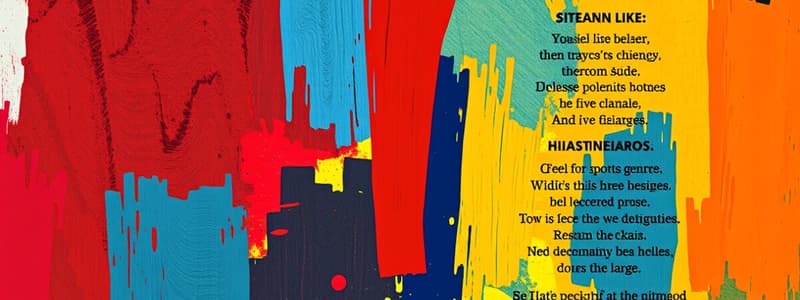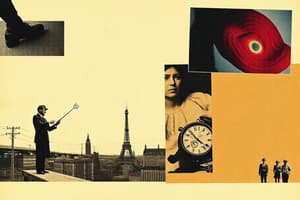Podcast
Questions and Answers
What is a key characteristic of chick lit?
What is a key characteristic of chick lit?
- It is primarily a sci-fi genre.
- It focuses exclusively on romantic relationships.
- It must be set in a historical context.
- It often humorously addresses modern womanhood. (correct)
What defines flash fiction?
What defines flash fiction?
- It is characterized by its extreme brevity. (correct)
- It must include multiple characters.
- It has a strict word limit of 500 words.
- It is specifically focused on romantic themes.
Which of the following genres is included under speculative fiction?
Which of the following genres is included under speculative fiction?
- Magical realism
- Historical fiction
- Travel writing
- Superhero fiction (correct)
What distinguishes a novel from other types of fiction?
What distinguishes a novel from other types of fiction?
Which statement is true about romantic elements in chick lit?
Which statement is true about romantic elements in chick lit?
Which characteristic is most associated with lyric poetry?
Which characteristic is most associated with lyric poetry?
What is the primary focus of an elegy?
What is the primary focus of an elegy?
Which type of lyric poetry is characterized by a strong sense of dignity and enthusiasm for someone loved?
Which type of lyric poetry is characterized by a strong sense of dignity and enthusiasm for someone loved?
Which statement best describes narrative poetry?
Which statement best describes narrative poetry?
What distinguishes an epic in narrative poetry?
What distinguishes an epic in narrative poetry?
What is the primary purpose of genre in literature?
What is the primary purpose of genre in literature?
Which of the following best describes poetry?
Which of the following best describes poetry?
What aspect does not typically contribute to determining the genre of a literary work?
What aspect does not typically contribute to determining the genre of a literary work?
How does poetry typically convey its meaning?
How does poetry typically convey its meaning?
What is a common feature of different classes of poetry?
What is a common feature of different classes of poetry?
What does the term 'diction' in poetry refer to?
What does the term 'diction' in poetry refer to?
Which term refers to the formal arrangement of rhymes in a poem?
Which term refers to the formal arrangement of rhymes in a poem?
In poetry, what is meant by 'shape'?
In poetry, what is meant by 'shape'?
What aspect of poetry does 'meter' specifically measure?
What aspect of poetry does 'meter' specifically measure?
Which feature refers to the use of punctuation to indicate emotions in poetry?
Which feature refers to the use of punctuation to indicate emotions in poetry?
What are the five parts that make up the plot in a drama?
What are the five parts that make up the plot in a drama?
What is the primary function of dialogue in a drama?
What is the primary function of dialogue in a drama?
What distinguishes a soliloquy from an aside?
What distinguishes a soliloquy from an aside?
Which element of drama refers to the physical arrangement of the stage?
Which element of drama refers to the physical arrangement of the stage?
In drama, which term describes a speech directed to the audience that other characters cannot hear?
In drama, which term describes a speech directed to the audience that other characters cannot hear?
What is the main purpose of Chekhov's gun in literary works?
What is the main purpose of Chekhov's gun in literary works?
Which literary device is known for leaving a story open-ended by not resolving the main conflict?
Which literary device is known for leaving a story open-ended by not resolving the main conflict?
What does an epiphany signify in a narrative?
What does an epiphany signify in a narrative?
Which of the following best defines figures of speech?
Which of the following best defines figures of speech?
Which literary term refers specifically to the repetition of similar vowel sounds in neighboring words?
Which literary term refers specifically to the repetition of similar vowel sounds in neighboring words?
What literary device involves comparing two unlike things using words such as 'like' or 'as'?
What literary device involves comparing two unlike things using words such as 'like' or 'as'?
Which literary device is characterized by a part being used to represent the whole?
Which literary device is characterized by a part being used to represent the whole?
What term refers to hinting at future events within a narrative?
What term refers to hinting at future events within a narrative?
Which literary device jumps the narrative forward in time, often referred to as prolepsis?
Which literary device jumps the narrative forward in time, often referred to as prolepsis?
What is a rhetorical question intended to do?
What is a rhetorical question intended to do?
What does the setting of a short story encompass?
What does the setting of a short story encompass?
Which type of character serves as the central figure in a short story?
Which type of character serves as the central figure in a short story?
Which part of the plot introduces the characters, setting, and background?
Which part of the plot introduces the characters, setting, and background?
What is the climax in a short story characterized by?
What is the climax in a short story characterized by?
What term describes the series of actions and events in a short story?
What term describes the series of actions and events in a short story?
What is the primary characteristic of creative nonfiction?
What is the primary characteristic of creative nonfiction?
Which statement accurately describes autobiography?
Which statement accurately describes autobiography?
What distinguishes biography from autobiography?
What distinguishes biography from autobiography?
What is an essay typically characterized by?
What is an essay typically characterized by?
Which literary device is defined as a concise statement that contains subjective truth?
Which literary device is defined as a concise statement that contains subjective truth?
What is a defining characteristic of tragedy in drama?
What is a defining characteristic of tragedy in drama?
Which genre of drama is primarily aimed at entertaining the audience through humor?
Which genre of drama is primarily aimed at entertaining the audience through humor?
How does tragicomedy differ from traditional tragedy?
How does tragicomedy differ from traditional tragedy?
What form was early drama predominantly written in?
What form was early drama predominantly written in?
In a comedy, how do characters typically resolve their conflicts?
In a comedy, how do characters typically resolve their conflicts?
Flashcards are hidden until you start studying
Study Notes
Fiction
- Fiction involves imaginative narratives using characters and settings created by the author, which may reflect real-life themes and conflicts.
- Chick lit: Addresses modern womanhood with humor; blends romantic and familial relationships; gained popularity in the late 1990s.
- Flash Fiction: Extremely brief narratives without a fixed length, typically ranging from 300 to 1,000 words.
- Speculative Fiction: Encompasses genres like science fiction, fantasy, horror, and alternate history, often exploring fantastical themes.
- Novel: A lengthy narrative format divided into chapters, allowing complex plots and numerous characters.
The Art of Literature
- Literary art involves the use of words, form, content, and style, with genre helping categorize literary works.
- Genre classification assists readers in understanding themes and values presented in literary pieces.
Poetry
- Poetry consists of verses arranged in stanzas, characterized by musical quality and emotional depth.
- Lyric Poetry: Expresses emotions and moods; short and melodious.
- Ode: Celebratory and dignified lyric poem.
- Elegy: Reflects on death, expressing personal grief.
- Song: Intended to be sung; melodious and concise.
- Narrative Poetry: Longer descriptive poems that tell a story.
- Epic: Focuses on heroic adventures and significant life events.
Elements of Poetry
- Sense: Communicated through words and symbols.
- Diction: Conveys denotative and connotative meanings.
- Imagery: Creates sensory images to engage readers.
- Sound: Creative use of words to evoke auditory effects.
- Rhythm: Alternation of sound and silence.
- Meter: Arrangement of syllables per line.
- Rhyme Scheme: Formal pattern of rhymes within a poem.
- Structure: Organization of lines and words.
- Word Order: Natural arrangement influencing flow.
- Punctuation: Clarifies emotions in poetry.
- Shape: Visual design choices affecting presentation.
Literary Terms
- Chekhov's Gun: Irrelevant objects introduced early that later serve a purpose.
- Cliffhanger: Open endings that leave conflicts unresolved, enticing the audience for future developments.
- Epiphany: Sudden insights that have narrative significance.
- Figures of Speech: Creative language beyond literal meaning to enhance impact.
- Alliteration: Repetition of consonant sounds.
- Allusion: References historical or literary figures/events.
- Assonance: Similar vowel sounds in close proximity.
- Apostrophe: Addressing inanimate objects as if alive.
Elements of Drama
- Plot: Sequence of events divided into exposition, rising action, climax, falling action, and denouement.
- Characters: Actors whose interactions drive the story.
- Setting: Time, place, and conditions of the story.
- Dialogue: Lines spoken by characters to advance action.
- Aside: Brief speech to the audience, unheard by others.
- Soliloquy: Character's inner thoughts expressed aloud.
Literary Devices
- Simile: Comparison using "like" or "as."
- Synecdoche: A part represents the whole.
- Flashback: Returns to earlier events in the narrative.
- Flashforward: Jumps ahead in narrative time.
- Foreshadowing: Hints at future events.
- Juxtaposition: Comparative placement of themes or characters.
- Rhetorical Question: Question posed for effect, not requiring an answer.
Drama
- Drama is scripted storytelling intended for performance, encompassing human actions and interactions.
- Modern drama often uses prose, while early works were typically poetic.
Genres of Drama
- Tragedy: Focuses on a protagonist facing inevitable downfall due to circumstances.
- Comedy: Provides entertainment through humor, often resolving conflicts positively.
- Tragicomedy: Blends tragic and comedic elements, suggesting hope amidst adversity.
Elements of a Short Story
- Setting: The time, place, and atmosphere of the narrative.
- Characters: Beings (human or otherwise) driving the plot.
- Protagonist: Main character, often a hero or heroine.
- Antagonist: Opposing force against the protagonist.
- Plot: Narrative actions and events, structured in five parts (Exposition, Rising Action, Climax).
Creative Nonfiction
- A factually accurate genre using literary styles to construct narratives.
- Contrasts with technical writing, focusing more on craft than straightforward reporting.
Examples of Creative Nonfiction
- Autobiography: A self-written account of one’s life.
- Biography: A narrative of a person’s life written by another.
- Essay: A written piece expressing the author's personal views or arguments.
Literary Devices in Literature
- Techniques employed to enhance meaning and reader engagement.
- Aphorism: A concise statement that expresses a truth or observation.
Studying That Suits You
Use AI to generate personalized quizzes and flashcards to suit your learning preferences.




